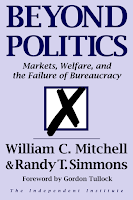 After reading War and Peace, I decided to take a day or two and read something so incredibly awesome that I could hardly contain my enthusiasm, so I read the 11th Master and Commander book (The Reverse of the Medal, which I'll be posting about next). Following the wonderful 4 hour journey with Captain Jack Aubrey and his trusty ally Stephen Maturin, I decided to hunker down with another thinker, <-- this book (I don't know why I love those arrows so much, but I do), Beyond Politics, a 220 pg. treatise on public choice theory by the now-deceased William C. Mitchell and one of our very own professors here at USU, Randy Simmons.
After reading War and Peace, I decided to take a day or two and read something so incredibly awesome that I could hardly contain my enthusiasm, so I read the 11th Master and Commander book (The Reverse of the Medal, which I'll be posting about next). Following the wonderful 4 hour journey with Captain Jack Aubrey and his trusty ally Stephen Maturin, I decided to hunker down with another thinker, <-- this book (I don't know why I love those arrows so much, but I do), Beyond Politics, a 220 pg. treatise on public choice theory by the now-deceased William C. Mitchell and one of our very own professors here at USU, Randy Simmons.The book is a brief summary of public choice theory and the market-failure oriented welfare-economist perspectives and a treatise on why the government can't honestly be expected to solve any problems that individuals in their individual and non-coerced collective capacity can't solve themselves.
Basically, public choice theory attempts to use the tools, treatises, and dialogues of economics to understand political and governmental behavior. Contrary to the claims of the welfare-economists, socialists, governmental do-gooders, etc. the government is not the place where virtuous righteous citizens come to deliberate and decide the issues facing the nation in a manner most beneficial to the greatest number of constituents (the nation as a majority-whole). Instead, the government is a place where self-interested politicians and bureaucrats come to maximize their personal considerations (votes and prestige for politicians, salary, security, and power for bureaucrats) and even those who are not consciously selfish will be perverted by the structure and process of the system.
The book does not argue that the government shouldn't attempt to solve the problems of poverty, pollution, urban violence, etc. The book argues that the government can't solve these problems for a variety of institutional and "scientific reasons. The attempts to do so have resulted in at best little gain and at worst massive losses to the situation. Some examples:
- Many welfare programs are traps designed to maximize votes for the middle-class, not function as safety nets.
- The costs of the Clean Air Act have been twice as large as the benefits.
- Political campaigns are characterized by discussions about which candidate is best at pork barrel (substitute "theft from non-constituents" for "pork barrel") politics, not which candidate best serves the public interest.
- Taxpayer monies have been used to destroy important environmental amenities, including Yellowstone National Park.
- Regulations usually end up serving the regulatees, not the consumer.
- Fiscal policies exaggerate and exacerbate business cycles. Some cycles are caused by fiscal policies.
- Voters are rationally ignorant of the actions and often even the names of their politicians.
- Given voting cycles and the role of leadership, the results of many democratic decisions are arbitrary.
This view I hold to, nearly dogmatically. I look forward to any debate sure to follow. I'm sure AJ and Luke will voice their contrasting but dogged hatred of authority and the government, I'm sure Kelsi will tell us yet again how sick she is of us talking about politics, and Kelsha will remind us to be nice to each other.

2 comments:
I kinda like the sound of this. Follow the money to find real intentions. Papa Allan would flip for this he's always saying it's all about the money. Though, I may just be dumb but I didn't catch the solution to the problem. I don't care so much about nay-sayers who just point out problems without presenting possible, however idiot, solutions.
I like books that inform the public. But I can't read them because I would get too worked up and want to change the world!
This is why I will be a neutral rhetorician possibly with a talk show. Thus, I will be above politics and able to point and say nahnah nah nah nay nay, aka absolutely nothing to fix anything..
Post a Comment